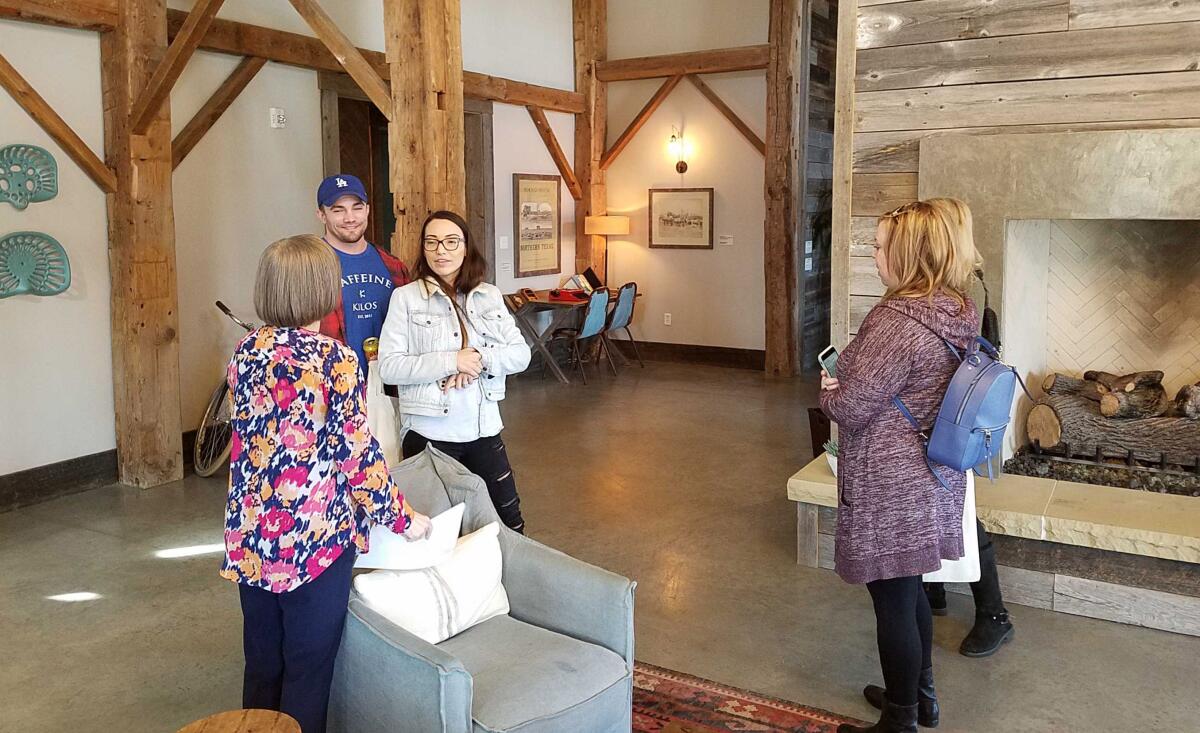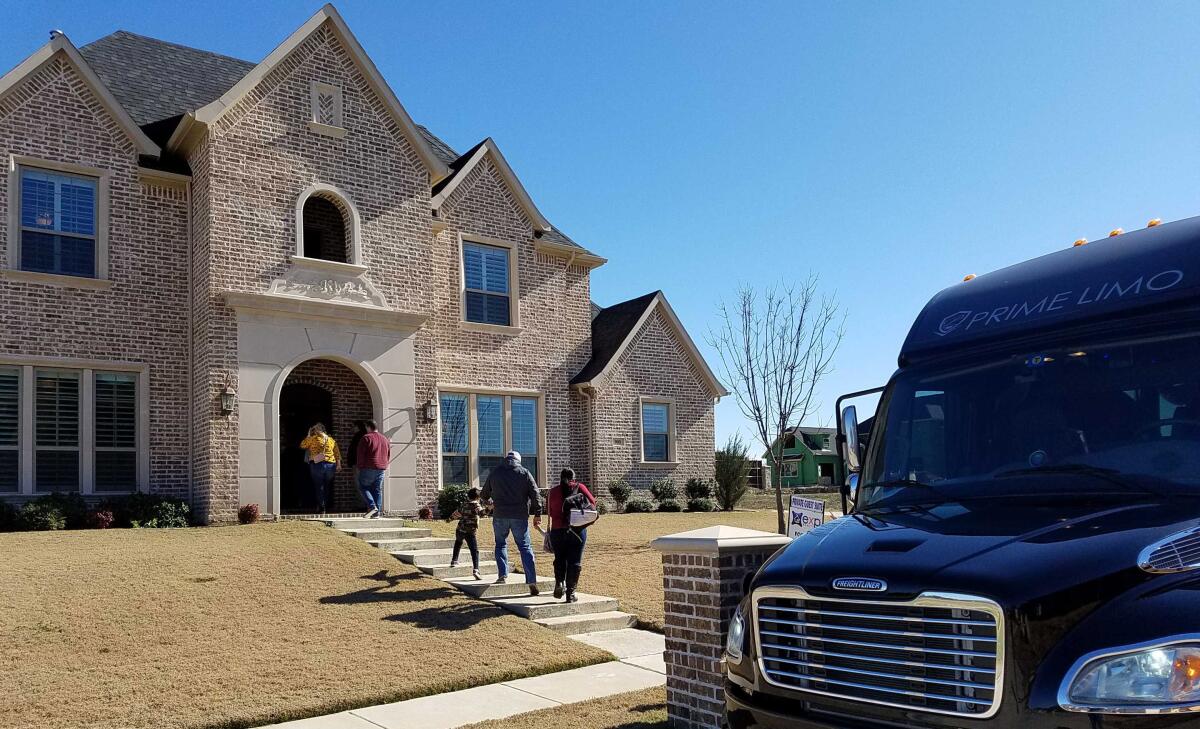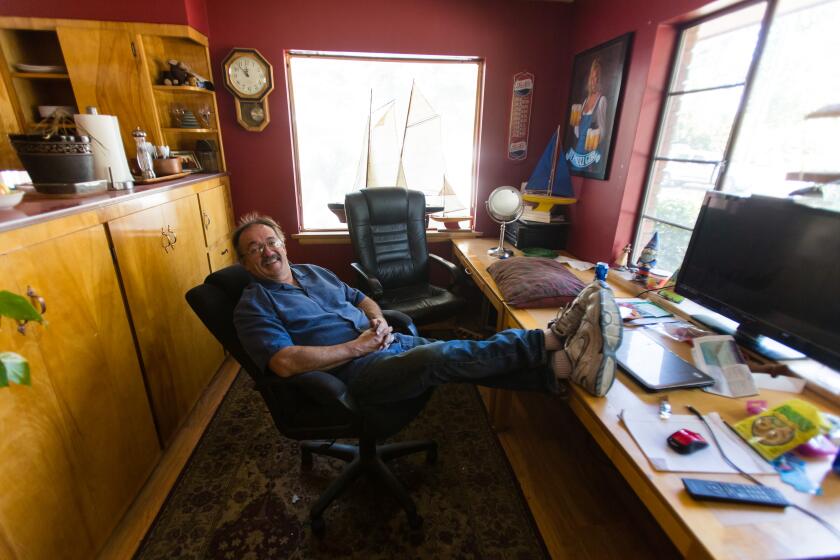Ready to move, Californians tour their top destination: Texas

PROSPER, Texas — When half a dozen California families arrived in a limo-style bus for a daylong tour of suburban homes for sale north of Dallas, the sun was shining but the temperature had dipped below 50 degrees. Some came unprepared for the cooler weather, shivering in hoodies, flip-flops and one in a Dodgers cap.
“Don’t know how much walking I’ll be doing,” said Paul Paone, 57, a grandfather wearing flip-flops and shorts.
Californians have been leaving the Golden State for decades in search of cheaper housing, lower taxes and a different way of life. According to a UC Berkeley poll conducted for the Los Angeles Times last year, more than half of California’s registered voters have considered leaving the state. For thousands, that search leads to Texas. California lost 1 million residents to other states from 2007 to 2016, about 2.5% of its total population, and Texas was the most popular destination, according to a 2018 report from the state Legislative Analyst’s Office. The main reasons Californians cited for wanting to leave: high housing costs (71%), taxes (58%) and the state’s political culture (46%).

Saturday’s tour crowd shared those concerns, but also worried about the trade-offs of leaving California.
One couple from San Diego with two small children had yet to tell their family they were considering the move, but their financial incentive was clear: He’s a 100% disabled Marine, which in Texas means they won’t have to pay property taxes.
Before boarding their tour bus, arranged by Realtor and California expat Marie Bailey, who caters almost exclusively to those moving between the two states, the families met at the cafe of the master-planned community in Prosper where Bailey settled with her family, Windsong Ranch.
With its private poolside cabanas, tennis courts and artificial crystal lagoon, it was among the pricier developments they would tour: $400,000 to $1 million for 1,900 to 5,600 square feet. Her husband noted that three years ago, Toyota relocated its U.S. headquarters from Torrance to nearby Plano, and many of the workers now live in the area.
“We’re going to look at a lot of price points today, so just take it all in,” Bailey said as they boarded the bus to their first home.
Paone and his wife had already left Southern California years ago for Nevada — which, like Texas, has no state income tax — but want to live closer to their eldest son, Tim Paone of Hawthorne, also on the tour with his wife and two small children. They can’t all afford to buy homes in California, they said.
Kathy Paone, 55, noted a decorative sign in a model home they visited that said, “All I need today is a little coffee and a whole lot of Jesus.”
The night before, Paone had stopped to say grace before eating at a Tex-Mex restaurant and, instead of feeling out of place as she says she does in California, she was comforted to see others praying, too.
Her son didn’t notice.
“Politics isn’t that big a deal to me. The bigger thing is cost of living, how cramped it’s getting,” said Tim Paone, 31, a software developer. “We have a lot of friends who are considering moving out of L.A.”
He had promised to report back on the Texas tour to three other families renting in Venice.
Bashing newcomers from California is a cyclical sport with a long history in the heart of Idaho’s Treasure Valley.
Bailey was quick to note the price tag for a 2,800-square-foot brick ranch-style house they toured with four bedrooms and three bathrooms: $489,000.
“Too small!” joked Ashley Bustos, 30, a cosmetologist and mother of two from Fullerton.
“Oh! We were guessing $700,000,” said a firefighter’s wife from Valencia who asked not to be identified because she’s hoping her husband can move out of state and commute as other firefighters they know have been doing.
“That’s cheap!” added her sister, who lives in Palmdale.
There’s a $130 monthly homeowners’ association fee, but that’s nothing compared with Ladera Ranch in Mission Viejo, which can cost hundreds a month, Bustos said.
Later that day, touring another palatial home with 20-foot ceilings, Bustos exclaimed: “This is Ladera on steroids!”
She and her husband, Luis Bustos, 29, a car painter, came to Texas looking for “medical freedom” — that is, the freedom not to vaccinate their two sons, ages 9 and 4. Their older son attends public school with a religious exemption, but California made the process more difficult just as they’re about to register their younger son for kindergarten.
Ashley Bustos said she worries they will miss California and her husband’s extended Mexican American family, who gather at the couple’s house on weekends.
“I have major cold feet,” she said on the bus. “My husband says we’ll miss the beach. I say, ‘Honey, we go once a year!’”
Bustos identifies as independent, politically. On Bailey’s Facebook page, she’s seen Texans rant about newcomers trying to “California my Texas,” but doesn’t worry about being accepted.
“I won’t change the colors of the state” politically, Bustos said.
But Andy Simich, 30, the one in the Dodgers cap, might. The defense contractor and former Marine is a Democrat, as is his wife, Valentina Caceres, 28, a Navy veteran he met while training at Camp Pendleton. The couple, who have a 5-year-old son and nearly 2-year-old daughter, lived in Yorba Linda until last year, when they began considering Texas.
“The second time my truck got broken into, we started having conversations,” he said.
They almost bought a condo in Fullerton for $500,000 in 2017, but the financing fell through, he said. During Saturday’s tour, they said they’re glad it didn’t work out.
“Now we can afford where we live,” he said.
His wife agreed.
“It’s a lot easier to get a house here, and you can get a lot more,” she said, noting local schools offer bilingual immersion classes (she’s Colombian American).
Of the communities they toured, the one that excited them the most was Light Farms in Celina, with its locavore restaurant, artificial sandy beaches and clubhouse fashioned from a 19th century Pennsylvania barn. Homes start at $256,990 for 1,507 square feet.
In July, the couple moved to a relative’s house in the Fort Worth suburb of Granbury. Andy Simich has been commuting to work in California, and they plan to buy a house of their own this year. Recently, Valentina Simich’s car — which still has California plates, a common sight in North Texas — was egged. They’re not sure who was responsible, but said they won’t let it deter them from buying a home.
Some Texans resent the influx of Californians, who they worry will change the state’s conservative culture and increase housing costs and traffic.
“I was raised in Texas and am Texan from my Stetson to my Tony Llamas. Especially my heart. I don’t want any of that California mess brought to my state,” Charles Hollingsworth of Amarillo wrote on the Facebook page “Don’t California My Texas”.
Last year, Bailey started receiving threats for helping Californians relocate. Angry Texans called her house, posted on her Facebook page and used it to create a viral meme that accused her of being a terrorist threat — to their way of life.
“There’s some people that think I have power over people moving here,” Bailey said.
In a way, she does. The Facebook page she started four years ago after moving from Seal Beach has more than 15,000 followers. She lures them with tales of how she and her husband, a tech executive, traded their 50-year-old, 1,500-square-foot California home for a Texas mansion. Bailey — a libertarian who supports abortion and LGBTQ rights — added rules to her Facebook page against discussing abortion, vaccinations, recalling Gov. Gavin Newsom and “drive-by” postings of “Don’t California My Texas.” (Dodgers/Astros posts were still allowed this week.)
On Saturday, her tour group ate a lunch of brisket sandwiches from Dickey’s Barbecue Pit paired with sodas and beer from Granbury’s Revolver Brewing. Some said they had already tried Whataburger, and debated whether they still preferred In-N-Out (opinion was divided).
The tour ended at a wine bar, Destinations, founded by a Sonoma transplant, Eric Harnett, who moved to Texas three years ago after wildfires ravaged Northern California. The visitors quizzed him about the most common natural disaster to strike North Texas historically: tornadoes. Harnett downplayed the risk.
“Earthquakes and hurricanes are city destroyers,” he said, but when a tornado strikes, “If it’s two blocks away, you wouldn’t even know it.”
The Californians didn’t ask about earthquakes, which have increased in North Texas and Oklahoma during the past decade as oil companies have expanded hydraulic fracturing, also known as fracking.
Some said they would miss California’s beaches, or the breezes. Harnett said he did too. That’s why he booked a trip last year — to Costa Rica.
“You just fly to an ocean,” Harnett said, “You save enough money.”
By the end of the tour, as the bus returned to Windsong Ranch, many of the visitors were sold on Texas.
Luis Bustos was still hesitant to leave his home state.
“But a lot of things are changing in California,” his wife reminded him.
She had already arranged another home tour the following day.
More to Read
Sign up for Essential California
The most important California stories and recommendations in your inbox every morning.
You may occasionally receive promotional content from the Los Angeles Times.












